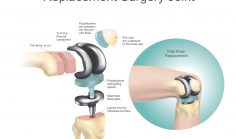Knee pain is an extremely common occurrence. It may be chronic (long-lasting) or acute (short-term). According to a recent study conducted by the Centers for Disease Control (CDC), approximately 20% of adults ages 18 and up reported experiencing knee pain. Almost all Americans will experience some form of knee pain during his or her life. Knee pain can be caused by a variety of factors and therefore there are many different pathways for treatment and prevention.
Knee Pain

What Is Knee Pain
What Causes Knee Pain
Knee pain can be caused by a variety of factors. Common causes of knee pain include:
Age-related degeneration. The knee is a complex joint that withstands an immense amount of pressure from walking, jumping, running, etc. According to researchers at Harvard Medical School, the forces exerted on the knees while walking on level ground is equal to 1 ½ times the weight of the body. For example, a person weighing 150 pounds exerts about 225 pounds of pressure on the knee joints. Because the knee sustains such a large amount of impact, as the body ages, protective cartilages may become worn or damaged and the supporting muscles may weaken.
Arthritis. Arthritis is a common condition that causes joint pain. According to the Center for Disease Control, approximately one in five (22.7%) adults in the United States report having doctor diagnosed arthritis. The prevalence of arthritis increases to almost 1 in 2 for adults ages 65 and older. For more information on arthritis, visit the Arthritis Condition Center.
Injury. Knee injuries account for approximately 15% of sports injuries. Knee injuries can also be caused by accidents, falls, slips, or other trauma to the knee. Common knee injuries include:
- Sprains/strains, which occur when the muscles and ligaments surrounding the knee joint become overstretched or torn.
- Fractures/breaks, most commonly occurring in the kneecap or bones of the leg.
- Torn meniscus, which is the connective cartilage of the knee.
- Dislocation of the knee cap, which occurs when the kneecap, the flat bone at the front of the knee, becomes dislodged from its normal position.
- Debris. Injuries and age/illness-related degeneration can cause bone fragments to chip off the bone and into the knee joint, interfering with its normal range of motion.
- Ligament tears. Ligaments are thick connective tissues that hold together the bones of the knee joint. When these tissues tear, the functioning of the joint can be severely compromised. The two most commonly torn ligaments of the knee are the ACL (anterior cruciate ligament) and the MCL (medial collateral ligament).
Risk Factors For Knee Pain
The following factors can increase your risk of developing a knee injury:
- Age. Adults ages 65 and over are at a higher risk for developing joint-related diseases such as osteoarthritis and rheumatoid arthritis. Changes in bone density and muscle strength may also put older patients at risk for knee injury.
- Existing health conditions. Pre-existing health conditions, such as osteoarthritis, osteoporosis, arthritis, and other diseases affecting joint, bone, or tissue health, can raise the risk of knee pain.
- Sex. Women typically have wider pelvises, which affects the angle at which the leg and thigh muscles join at the knee. This difference in angle makes women more prone to knee injuries.
- Weight. According to researchers at Harvard Medical School, the knees experience the weight of 1½ times the body weight when walking on level ground. Therefore, the more a person weighs, the more stress is put on the knee joint.
- Athletics. Athletes that constantly engage in strenuous exertion are more likely to sustain knee injuries than non-athletes. Proper warm ups and stretching can help prevent sports-related injuries.
Diagnosing Knee Pain
Diagnostic procedures for the underlying causes of knee pain vary. If you are experiencing knee pain, see a doctor. He or she will be able to conduct the proper set of diagnostic tests to determine the cause of your knee pain. Tests that your doctor may conduct include:
Medical history/family history. A complete medical history, including a list of symptoms and a family history of disease, will help your doctor better understand your risk of certain illnesses/conditions.
Physical exam to look for physical signs of knee injury/illness including discoloration, swelling, tenderness, range of motion, strength, and warmth.
Imaging techniques, which help provide doctors with images of the knee joint tissues/bones. These include:
- X-rays, which are effective for imaging bones
- MRI (magnetic resonance imaging), which are much more sensitive for soft tissues, such as muscle, ligaments, and tendons
Blood tests to rule out the presence of certain disease-specific proteins.
Living With Knee Pain
The following tips can help you manage living with knee pain:
- Seek proper treatment. It may be tempting to delay a doctor’s visit by taking over the counter medications, but if you are experiencing knee pain that lasts more than a couple of days, you should see a doctor. It is also important to see a doctor after a fall or slip if you are experiencing any pain. A minor fracture, sprain, or ligament tear can become more serious if not treated correctly. Doctors can also help you find the right treatment pathway for conditions underlying knee pain, such as arthritis
- Give yourself time to rest. If your knee pain is the result of an injury, rest is essential to the healing process. If you have a chronic condition, pace yourself, making sure to not overexert yourself or your joints.
- Talk to your doctor about your treatment plan and any effects of it that you feel. If a certain treatment method isn’t working or is causing unfavorable side effects, he or she will be able to help you find a plan that better suits your body and needs.
- Don’t fall for scams. Knee pain is a common problem – so common that many people try to capitalize off of faulty treatment methods. Do your research on treatment methods and technologies to save your wallet.
- Consider physical therapy. Physical therapy combines a variety of movements that help decrease pain and increase mobility.
- Don’t be afraid to ask for help. It can be difficult to accept that you could use help, especially if it’s just with day-to-day activities like carrying the groceries or walking to the Laundromat. If you feel that you need assistance, ask family or friends to lend a helping hand or consider hiring an aide service.
Prevention
The following tips can help you prevent knee-related injury/pain:
- Keep a healthy diet and exercise routine, remembering to stay within the limits of your body. Proper nutrition and fitness will help keep bones and muscles healthy and strong, as well as prevent excess weight gain that puts additional stress on the knee joint.
- Do targeted exercises to strengthen the muscles of the leg that support the knee. This will help prevent injury and promote mobility.
- Don’t overexert yourself. It’s important to retain muscle strength, but overtraining can actually increase your risk of developing knee pain.
- Do a warm up before any exercise to get your body loose and ready to move.
- Stretch, but be careful to not overstretch. Extensive stretching before exercise can increase your risk of injury because it puts the muscle in a temporarily weakened state. Stretching is best done after (or during i.e. yoga) moderate exercise.
Medication And Treatment
Pain relief medications come in different forms and strengths. They are available as prescription or over-the-counter (OTC) medications and can treat various type of pain, including acute and chronic conditions, injuries and traumas, cancer and post-surgical discomfort. All medications have side effects, and many pain-relieving medications can be highly addictive. Speak with your doctor about what side effects you can expect from the medications you are taking.
Over-the-counter (OTC) pain medications include:
- Acetaminophen (Tylenol, aspirin-free Excedrin). Acetaminophen works on the parts of the brain that receive the “pain messages.”
- Nonsteroidal anti-inflammatory drugs(NSAIDs), including ibuprofen (Motrin/Advil)or naproxen (Aleve and Naprosyn). NSAIDs also reduce inflammation (swelling and irritation) and are also available in prescription strength.
- Topical pain relievers are also available without a doctor’s prescription. These products include creams, lotions, or sprays that are applied to the skin in order to relieve pain from sore muscles and arthritis. Topical pain relievers may be especially effective in dealing with the pain of arthritis in joints (including knee) back pain, and even headache pain. These include:
- Counter-irritants, such as menthol and camphor, which create a burning or cooling sensation to distract from the pain
- Salicylates, which relieve pain using the same ingredients as aspirin.
- Capsaicin, the substance responsible for the spice of hot chili peppers, which relieves pain topically in an unknown manner.
Prescription pain relievers include:
- Corticosteroids. Prescription corticosteroids provide relief for inflamed areas of the body by easing swelling, redness, itching,and allergic reactions. These include:
- Bethamethasone (Celestone)
- Prednisone
- Opioids. These are narcotic pain medications that contain natural, synthetic or semi-synthetic opiates. Opioids are often used for acute pain, such as short-term pain after surgery. MedlinePlus, a service of the U.S. National Library of medicine warns that these drugs can be abused, can be addictive, and have been associated with accidental overdose deaths. Always take opioids precisely as prescribed. Typically, prescriptions should not last more than three or four months:
- Codeine
- Fentanyl (Duragesic) — available as a transdermal patch
- Hydrocodone (Vicodin)
- Hydromorphone (Dilaudid)
- Meperidine (Demerol)
- Morphine (MS Contin)
- Oxycodone (Oxycontin, Percocet, Percodan)
- Tramadol (Ultram)
Some cases of knee pain may require surgical intervention. The specifics of knee surgery depend on the patient and the cause of the knee pain. Common surgical procedures performed on the knee include:
- Knee arthroscopy.Knee arthroscopy is a surgical procedure in which a probe and a camera instrument known as an arthroscope are used to visualize and treat knee injuries. Recovery time for these procedures is relatively short (several weeks) with proper medication and physical rehabilitation. According to the orthopedic surgery division at MassGeneral Hospital, arthroscopies are commonly performed to treat:
- Torn meniscus
- Debris in knee joint
- Fractures
- Torn ligaments
- Inflammation of the knee joint
- Knee replacement. Knee replacement surgery involves the partial or full replacement of the damaged joint with a prosthetic joint made from surgical grade metal and plastic. This procedure requires patients to be anesthetized and typically takes about two hours to complete. The Cleveland Clinic estimates that approximately 85% of prosthetic knee implants last 20 years or more. Patients considering knee replacement surgery should discuss the benefits and risks of the surgery with their doctors. Potential complications of the surgery are serious, including:
- Continued pain
- Worsened pain
- Implant malfunction
- Fracture
- Blood clots
- Bleeding
- Post-surgical infection
Physical therapy is a necessity after many surgical procedures to help regain strength and mobility of the joint. It can also help reduce pain and increase mobility for patients experiencing knee pain who have not undergone surgery.
Complementary and Alternative Treatment
According to the National Center for Complementary and Alternative Medicine (CCAM) the currently available evidence is not strong enough to allow definite conclusions to be reached about whether any complementary approach is effective for chronic pain. However, a growing body of scientific evidence suggests that several approaches may help to manage some painful conditions including low back pain, headaches, rheumatoid arthritis (including in the knee) and osteoarthritis.
These approaches are:
- Chiropractic treatment. Chiropractic treatment focuses on the restoration of the skeletal system, which may help relate certain forms of joint pain.
- Acupuncture. Acupuncture is a form of traditional Chinese medicine in which small needles are inserted into the body at specific points designed to restore the flow of bodily energy. Studies have shown that acupuncture treatments are effective at stress relief and pain relief.
- Massage. Studies show that massage therapy can help reduce pain and stress levels.
- Mind and body techniques such as yoga, tai chi, and meditation. These may help strengthen the body and mind to better handle the stresses of pain.
Marijuana has recently been in the spotlight as a possibly effective remedy for chronic pain sufferers. Several clinical studies have shown Marijuana’s ability to provide relief to chronic pain sufferers. Use of medical marijuana is controversial due to the substance’s reputation as a recreational drug. A growing number of states are legalizing medical marijuana, though the substance still remains illegal in the majority of the country.
When To Contact A Doctor
If you are experiencing unexplained knee pain, schedule an appointment with your doctor.
If you are taking pain medication and experience any of the following symptoms, call your doctor immediately:
- Nausea/vomiting
- Stomach pain
- Dizziness
- Changes in sleep habits
- Irregular heart rate
- Chest pain**
- Sudden weight loss/gain
- Rapidly worsening pain
** If you experience chest pain, call emergency services. This may be a sign of heart attack.
Questions For A Doctor
You may want to ask your doctor the following questions:
- What is causing my pain?
- How long will the pain last?
- What treatments are available?
- What are the side effects?
- How long will treatment last?
- Should I consider surgical options?
- What surgical options are available to me?
- What are the benefits and risks of surgery?
- What can I do to manage my pain?
- Should I be concerned about developing other conditions as a result of my pain?
- How will my condition limit my mobility?










